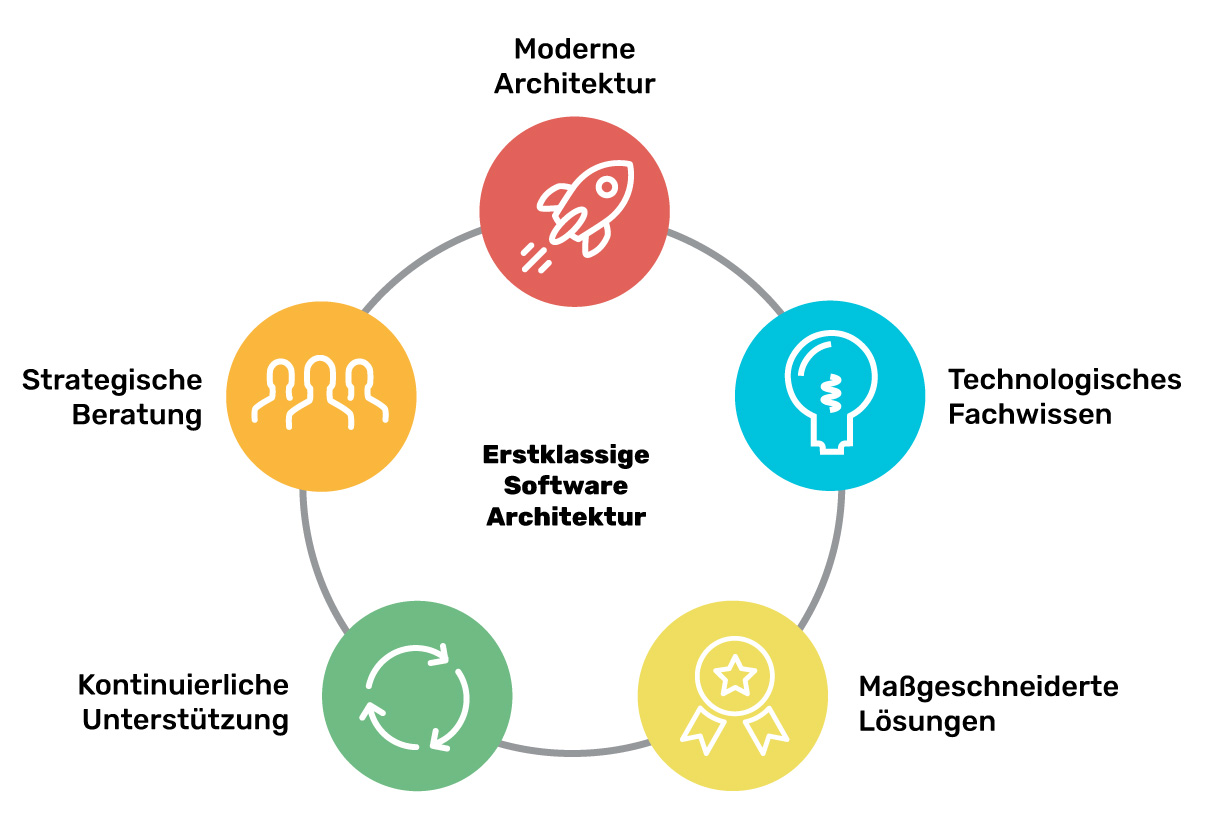
Modern software architecture
This is why a well thought-out software architecture is crucial
The software architecture lays the foundation for a stable foundation for every application and is largely responsible for the subsequent reliability, flexibility and security of the ecosystem. It strikes a balance between high performance and scalability, which is particularly essential in critical business processes.
An optimized software architecture can significantly reduce maintenance costs and lower the total cost of ownership. Solid security measures that are integrated into the architecture protect valuable data from potential threats. Ultimately, the software architecture makes a significant contribution to your company’s competitiveness and ability to innovate.

Quality features of modern software architecture
Quality is the top priority in all our projects. We therefore continuously optimize your software ecosystem in terms of performance, security, maintainability and user-friendliness. Our IT experts ensure that all software architecture quality features are adhered to and constantly improved.
Performance
Fast response times and a high processing speed, even under high load, not only increase efficiency, but also user satisfaction considerably. Code optimization and the use of powerful frameworks that make optimum use of system resources can therefore be used to increase performance.
Reliability
High availability and fault tolerance ensure continuous operation. This is because minimized downtimes and reliable software architecture are particularly important in business-critical applications.
security
One of the most important aspects of qualitative software architecture is security in order to protect systems from unauthorized access and sensitive company data. Therefore, it is important to consider security as an architectural goal from the very beginning and to design the application according to security by design principles. Through security reviews, we identify vulnerabilities in the system in order to recognize and eliminate potential security risks before an actual attack.
Maintainability
We create software architectures that simplify the maintenance, adaptation and expansion of the system in the long term, thereby reducing maintenance costs. We achieve this goal through clear and comprehensive documentation, a modular code structure and compliance with proven programming standards and conventions.
Portability
The fact that software can be executed on different platforms and environments increases the flexibility and range of the application, reduces the development effort and thus saves time and costs. To ensure portability, we rely on platform-independent programming languages, standardized interfaces and frameworks as well as containerized environments such as Docker.
Scalability
Thanks to a flexible and modular architecture, you can react more quickly to changes in the market. This means that new functions can be implemented without extensive redesign – which also speeds up the development of new features.

We are your partner for first-class software architecture

Different software architecture models
and their advantages
and their advantages
Choosing the right software architecture is crucial to the success of any project, as it forms the basis for the performance, scalability and maintainability of the application. Different architecture models also offer different advantages that are tailored to specific requirements and contexts – our BAYOOTEC experts will be happy to advise you on your choice.
Layered architecture (N-tier)
This structure separates the application into different layers (presentation, business logic, data access), which improves the maintainability and reusability of the code. The most important aspect here is that the different layers only communicate with the neighboring layers, which means that Presentation, for example, cannot access data directly, which contributes to the security of the application. In addition, the individual layers can be developed and tested independently of each other, which increases the speed of development.
Microservice architecture
Microservices enable the development, provision and scaling of small, independent services that can be operated independently of each other and communicate with each other via APIs. This increases flexibility and makes it easier to add new functions or make changes without affecting the entire system.
Service-oriented architecture (SOA)
A service-oriented architecture facilitates the integration of different services via standardized interfaces, which improves interoperability between different systems and platforms. This leads to better reusability of services, better scalability and easier adaptation to business requirements.

Event-driven architecture
This architecture model enables a loose coupling of components by sending and handling data and signals not directly, but in the form of events via a “service bus”, which leads to a more flexible and scalable application structure. As a result, systems can be designed to be resilient and respond efficiently to changes and new requirements.
Peer-to-peer architecture
In this structure, all nodes/clients are of equal value and share resources directly with each other, which increases the system’s failure tolerance and availability. Decentralization allows tasks to be organized efficiently, which is particularly advantageous for distributed systems and applications.
Get in touch now
Whether you already have a specific project in mind or are looking for answers to unanswered questions – we are here to help you.
Make an appointment here and let’s find the right approach for your project together.


